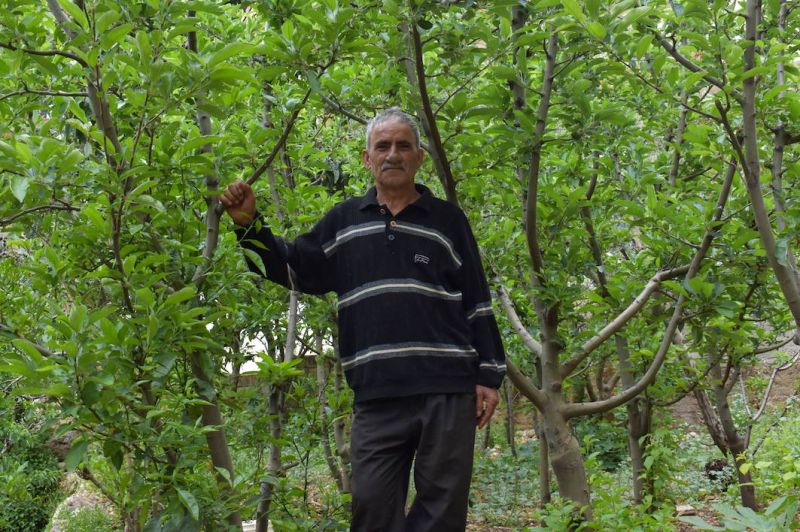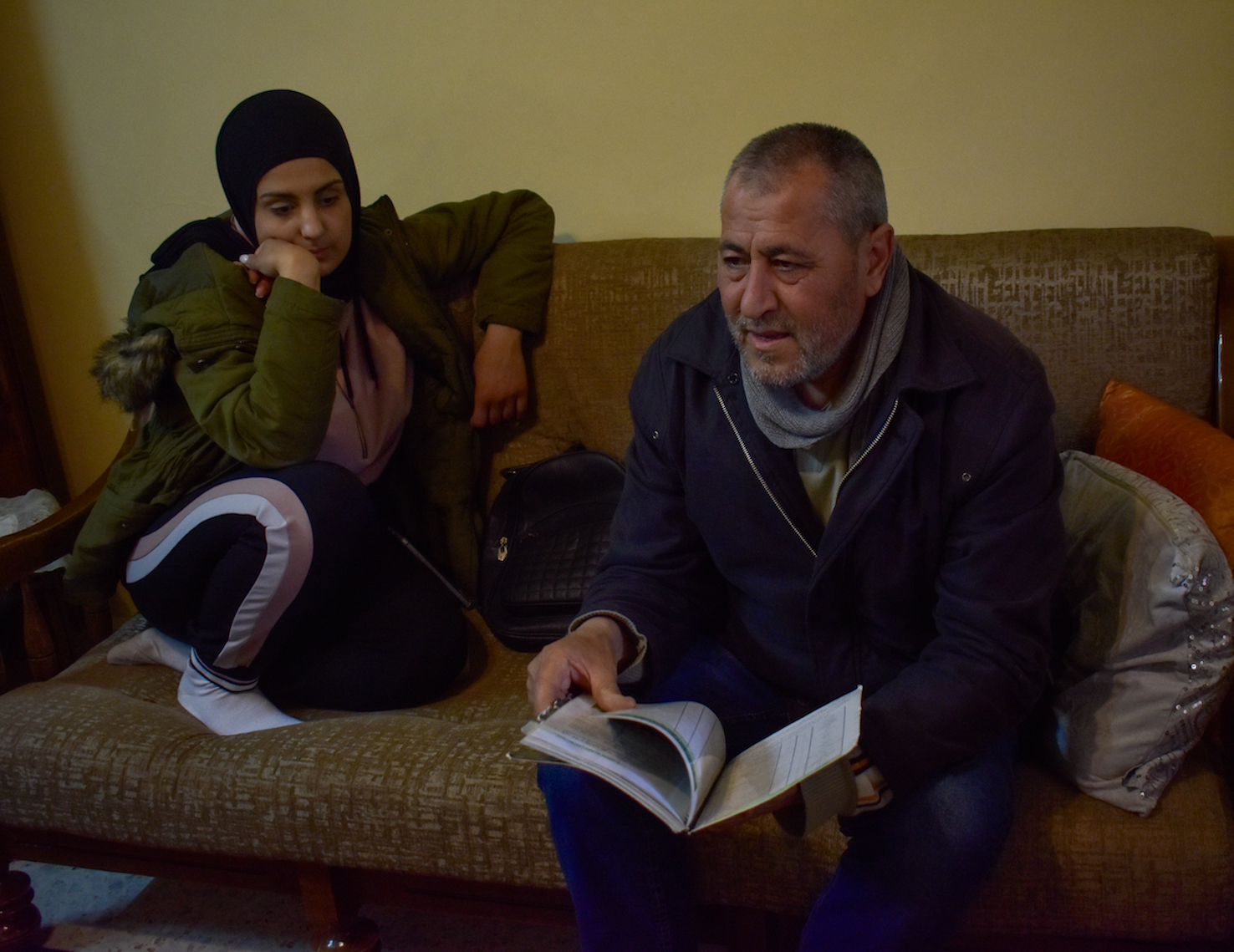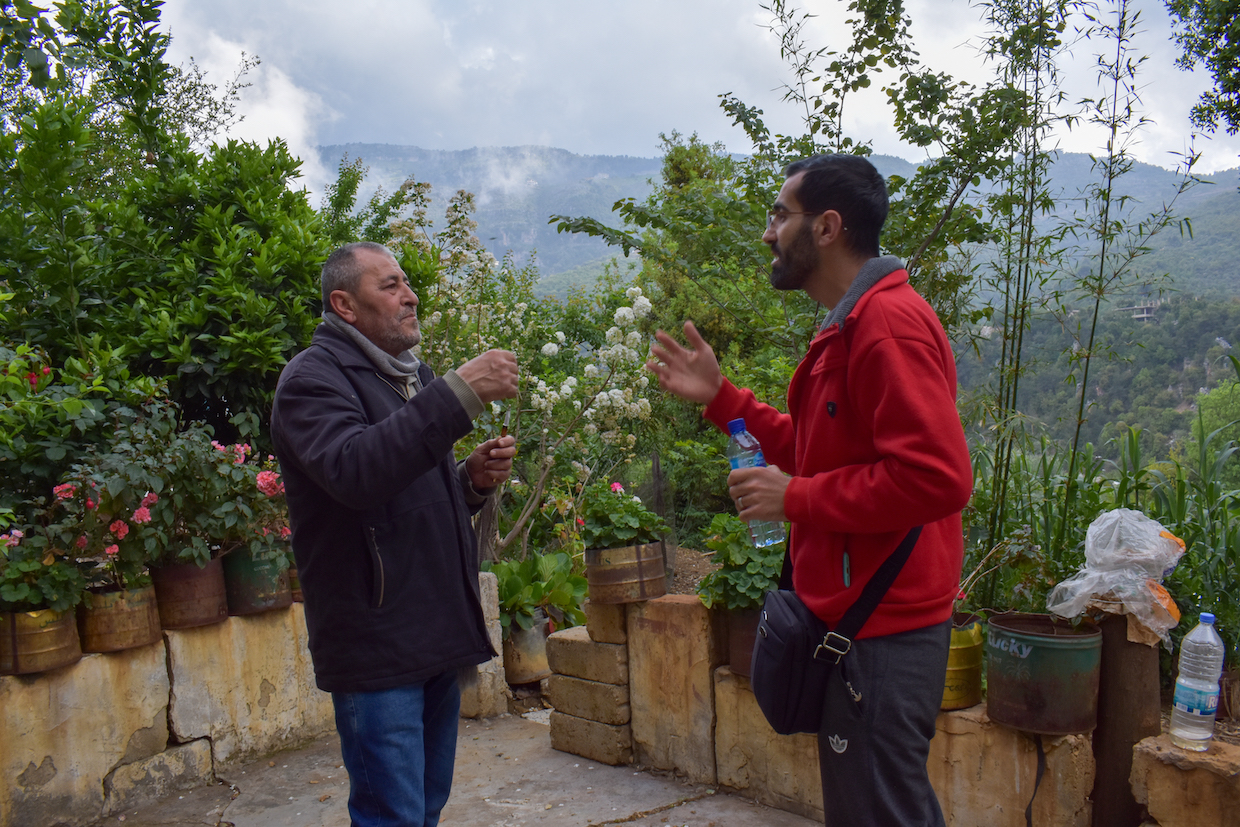
Mohammad Hassan Bahry poses among his trees in Akkar al-Atiqa. (Credit: Zayna Syed)
AL-ATIQA, Lebanon — Last year, for the first time ever, Ahmad Moustafa was forced to draw water from al-Oustouene River to irrigate his wheat fields. Since childhood, his family relied on rain pouring from the sky to tend to their 15,000 square meters of land in Akkar, where they grow fruit trees and wheat, as well as vegetables and beans on swaths of open land.
It’s not the only change. Since 2021, Moustafa has started to water his fruit trees a month or so earlier in the year, since the rain comes later than it used to, leaving the trees thirsty when they should be starting to produce fruit. He’s also noticed larger numbers of pests agitating his crops, often lingering for longer periods than before.
Akkar, specifically the land closest to the coast, is one of the regions of Lebanon most vulnerable to climate change, according to a 2022 report from the World Food Programme and American University of Beirut, which warns that all agriculture in Lebanon will be moderately or severely affected by climate change by 2050.
According to the report, climate change will affect Lebanon in several ways.
First, both minimum and maximum temperatures will rise.
Lebanon has already seen slight increases in temperature. Data from weather stations at AUB and the Beirut airport show that minimum temperatures have risen by about three degrees Celsius from 1874 to 2018. Maximum temperatures have risen far less.
“We have not seen such a quick increase of temperature in 100 years,” said Jocelyne Gerard, a professor at Saint Joseph University who has studied climate change in the country for nearly three decades.
Second, in the future, levels of precipitation will decrease. Some farmers may already be reporting less rain than before, but Gerard said meteorological stations don’t show any significant decrease.
The current problem is that the same amount of rain falls in shorter periods of time, meaning when rain is much more intense, according to Georges Gharios, an agricultural engineer who grows citrus in Akkar.
The third effect of climate change is that extreme weather events, such as flooding and droughts, will increase in both intensity and duration.
“The weather is critical to agricultural production and it becomes problematic when there is any disturbance in it,” said Nadim Farajalla, an author of the World Food Programme report and director of the climate change and environment program at the American University of Beirut’s Issam Fares Institute. “What climate change does is it creates this shifting in weather. You get extremes, you get early onset and late onset, etc.”
Seeing climate change firsthand
 Ahmad Mohammad Al Assaad and Fatima Slaiman discuss changing weather patterns in Akkar al-Atiqa. (Credit: Zayna Syed)
Ahmad Mohammad Al Assaad and Fatima Slaiman discuss changing weather patterns in Akkar al-Atiqa. (Credit: Zayna Syed)
Several farmers in Akkar told L’Orient Today they are already starting to feel the impacts of climate change.
“Of course climate change affects our crops,” said Khodor Mida, president of the Akkar Vegetable Producers Association. “It used to be that winter is winter, summer is summer, and we organize accordingly. Now our winter is summer and summer is winter.”
Less predictable weather is accentuating the existing market challenges facing Akkar’s farmers. Mida says changing rain patterns hit the potato crop badly. At the beginning of May, farmers stopped harvesting potatoes to protest the low prices merchants offered them.
In al-Atiqa, Mohammad Hassan Bahry built a large, cement-lined pool to store rainwater in 2013. They need about two full pools to irrigate their whole orchard during the peak harvesting season (July and August). In previous years, the pool would overflow with rain water. For the past two years, though, the reservoir is only about three-quarters full by the end of winter.
The decreasing rainwater coupled with increasing diesel and electricity prices, needed to pump water to the crops, led Bahry to switch from growing tomatoes and beans — with their high water demands — to walnuts. He continues to grow apples, although they require more water.
Bahry also started trucking in water to supplement rainfall, purchasing it from the local government that typically pumps groundwater. In the past, they’ve paid about $500 a year for water deliveries, although his daughter said that still isn’t enough to adequately water the crops.
Al-Atiqa resident Ahmad Mohammad Al Assaad has seen more insects picking at his fruit trees than before. There’s not snow like there used to be, he said. When snow fell, the insects died. Now, he’s forced to use more pesticides, which are expensive.
Farmers are already on a shoestring tight budget amid the country’s ongoing economic crisis. Some have been forced to resort to cheap black-market pesticides and fertilizers, which are banned even in Lebanon’s loosely regulated market for posing acute health risks, according to a report from the Synaps Network. Many farmers simply can’t afford to buy more pesticides, Assaad said.
Farmers know climate change is happening, perhaps more than the Lebanese public generally. In one 2021 study, researchers at Saint Joseph University surveyed 200 apple growers in the Bekaa and found most were aware of the issue.
“I believe in the perception of farmers,” Gerard said. “They are living with the environment.”
Adapt and ask for help
 Farmers Ahmad Mohammad Al Assaad and Ahmad Moustafa talk about the weather in al-Atiqa. (Credit: Zayna Syed)
Farmers Ahmad Mohammad Al Assaad and Ahmad Moustafa talk about the weather in al-Atiqa. (Credit: Zayna Syed)
The report also studied how much capacity these regions have to adapt to climate change, taking into account levels of poverty, food security, the number of residents who work as farmers and the climate sensitivity of crops, such as how much water and how many hours of chilling they require.
Akkar, from El Mina to the tip of the district, and some areas in East-Baalbek, will be most affected by the changing climate, the Synaps report suggests, and least able to adapt to it.
Most people in the region, among one of the poorest in Lebanon, are farmers. Most of the land is used for agriculture.
“When we talk about resilience to climate, it’s not only about climatic and meteorological factors that we worry,” said Farajalla, one of the report’s authors. “These may occur, but the ability of people to adapt to these changes and implement best-management practices is what is key.”
Farmers can see the climate shifting before their eyes, but that doesn’t mean they are always willing to change their life’s practices to adapt. “You know, climate change is not only a climate problem. It is not only a technology problem. Mostly climate change is a human problem,” said Gerard, noting that most farmers are older. “We must see how people are going to accept changing their behavior.”
There’s no easy fix and Farajalla and Gerard agree that most of the proposed solutions would require a strong government response.
Determined state action is difficult to imagine when legislators seem unwilling to agree on who will be president of the republic and the government’s mandate is restricted by its caretaker status. Meanwhile record inflation has enfeebled citizens’ savings, throwing nearly three quarters of the country into poverty, according to a report from 2022.
Professionals, including Farajalla and Gerard as well as environmental activist and academic Sammy Kayed, say the Lebanese state simply isn’t prioritizing climate adaptation, and has very little power to adapt.
Outside groups, particularly NGOs, are often constrained by short deadlines and the wishes of their donors. The best solution, Gerard said, would be local adaptation that takes into account Lebanon’s wide geographical diversity.
One group that proposes doing just that is Environment Academy, which assists communities in dealing with environmental degradation in their own backyard. Among their current projects is supporting the efforts of Harf Beit Hassna in nearby Dinnieh, North Lebanon, to solve its extreme water shortages — including by fundraising to build a well that can use solar energy to pump water to farmers.
Some farmers have taken matters into their own hands, conjuring up their own makeshift adaptation. In Harf Beit Hassna, farmers built their own water reservoirs, digging up trenches in the land and lining them with plastic to store rainwater.
Ahmad Moustafa said more farmers are starting to use drip irrigation as the technology becomes more widely available. Used in arid regions across the globe, the approach uses networks of perforated pipes to release incremental amounts of water into the soil. Drip is more efficient than traditional flood irrigation, where farmers inundate their land with water, which sometimes uses more water than is necessary and loses much to evaporation.
Farmers interviewed by L’Orient Today have thought about what they need to make agriculture more sustainable in Akkar. Bahry suggests al-Atiqa needs another well. Moustafa thinks a food processing plant, which could turn fruits into products, like apples into jams, could help. This would allow farmers more flexibility in what type of goods they sell to the market and the time of year at which they sell them.
Mida from the Akkar Vegetable Producers Association said the government prioritizes merchants over farmers, whom he believes have taken advantage of them. He calls for initiatives to help finance farmers’ irrigation, pesticides and other projects.
“We are ready for any initiative,” he said, “if someone can help.”
Additional reporting contributed by Yara Malka.
